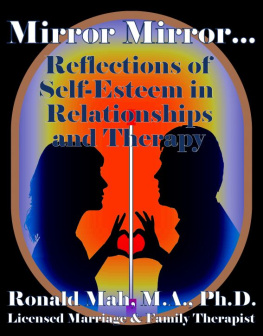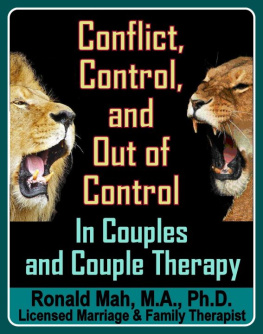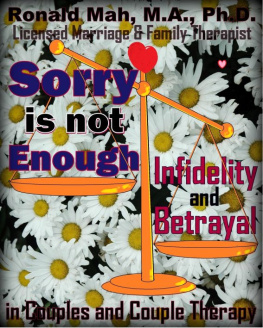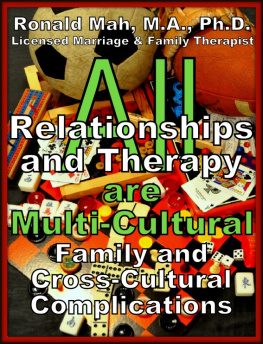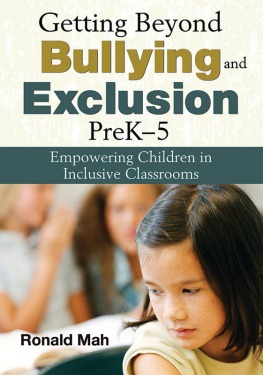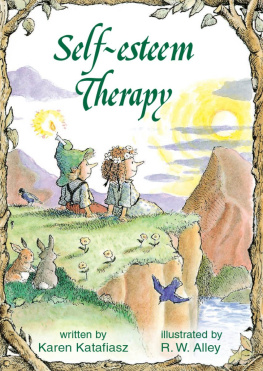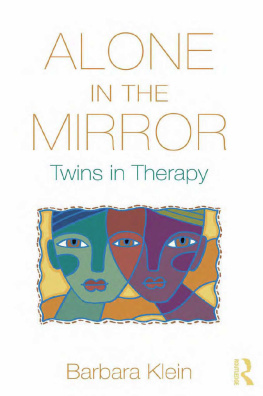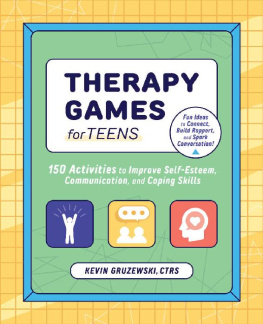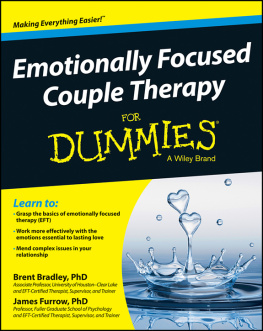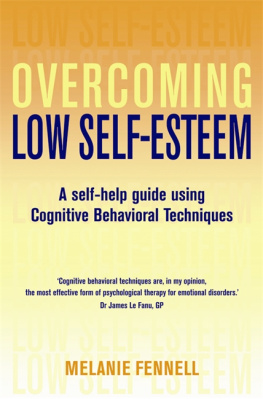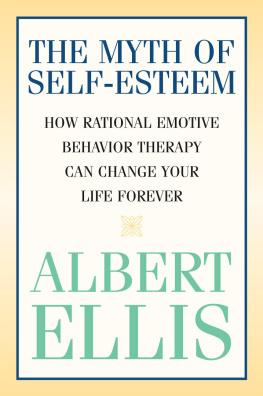Mirror Mirror
Reflections of Self-Esteem in Relationshipsand Therapy
Published by Ronald Mah at Smashwords
Copyright 2013 Ronald Mah
Ronald Mah's website- www.ronaldmah.com
Smashwords Edition, License Notes
T his ebook islicensed for your personal enjoyment only. This ebook may not bere-sold or given away to other people. If you would like to sharethis book with another person, please purchase an additional copyfor each recipient. If you're reading this book and did notpurchase it, or it was not purchased for your use only, then pleasereturn to Smashwords.com and purchase your own copy. Thank you forrespecting the hard work of this author.
****
Abstract:
T he request forcommunications oriented therapy often assumes a need forself-esteem focused therapy. Poor communication directly harmsself-esteem and relationships as individuals poorly mirror eachother. Comment, complaining, criticizing, contempt, defensiveness,disconnecting emotionally, and divorce are both stages ofrelationship devolution, but also concepts to assess communicationdynamics, relationships, and direct therapy. Blocked orinappropriate expression or feelings, covert communication, openversus closed communication, congruence and connection, stances,games, and dysfunctional rules and rituals are examined forrecognizing key relationship problems and therapeutic strategies.The development of self-esteem, relationship to socialization, theFour Principles of Self-Esteem, and mutually reciprocal affectsbetween confrontation and conflict lead to two specific tools: theFour Honorings of Communication and the Working It Out Plan fortherapy. In addition, the book presents the eight-step process tobuild the self-reflective foundations of self-esteem and theprojective formulative seven-step process of self-esteem and the90-Second-A-Day Self-Esteem Prescription Plan.
****
Linked Table of Contents
COMMENTING
COMPLAINING
CRITICIZING
CONTEMPT
DEFENSIVENESS
DISCONNECT EMOTIONALLY
DIVORCE
TERMINATION
BLOCKED OR INAPPROPRIATE EXPRESSION OFFEELINGS
COVERT COMMUNICATION
OPEN VS. CLOSED COMMUNICATION
CONGRUENCE AND CONNECTION
STANCES
GAMES
SIGNIFICANCE
MORAL VIRTURE
IDEAL SELF vs. REAL SELF
COUPLES AND MORAL VIRTUE
COMMUNAL POWER AND CONTROL
PASSIVE-AGGRESSIVE BEHAVIOR
I) KNOW ONESELF
II) BEING A MODEL OF SELF-LOVE
III) TAKE CARE OF ONESELFFIRST!
IV) BE AVAILABLE
V) CONTRACT OF AVAILABILITY
VI) SEPARATE- THERE'S TWO, NOT ONE
VII) DISTINGUISH LOVE AND LIKE
VIII) UNDERSTAND THE OTHER
I) VALIDATE THE OTHER PERSON
II) HOLD RESPONSIBILE W/O SHAME, BLAME,& FAULT
SPLIT MILK LEAVES NO STAINS
III) NO ABUSE ALLOWED
IV) SELFCARE
V) CHALLENGE / EXPECTATIONS VS.PUSH/DEMANDS
VI) APPROPRIATE PRAISE
POTENTIAL AND THE INNER FRAUD
VII) INTERNALIZED MOTIVATION
DOING THE HARD THING
SELF-ESTEEM & PERFECTION
MESSAGES OF WORTH
A TRUFFLE a WEEK
****
**A uthor's Note:Other than public figures or people identified in the media, allother persons in this book are either composites of individuals theauthor has worked with and/or have been given different names andhad their personal identifying information altered to protect andrespect their confidentiality.
INTRODUCTION: COMMUNICATIONSORIENTED THERAPY
"W e have troublecommunicating," says Terry looking over at Bert who nods inbegrudging confirmation. Thus, begins the conversation ofindividual, couple, or family therapy. It could be something deeplypersonal within the family, but could also be a consultation abouta relationship at school, work, or in the community such as inchurch or youth sports league. The relationship problem could bebetween the individual and a schoolmate, a work colleague,supervisor or supervisee, fellow parishioner, teammate, or othervolunteer. The individual, one or both partners, or one or morefamily members present this self-assessment to the therapist andset the goal, "I (or We) need help communicating better." Somehowhow they see themselves and how they see one another does notreflect the images they desire. They implicitly request theaccompanying strategy to heal or create intimate and/or moreproductive relationships. Therapist activity to help theindividual, couple, or family communicate better is expected tocreate a healthy partnership or relationship. A relationshipsuffers if what is put out to another is not reflected back in kindor in affirmative esteem and relationship building manners. One'spartner, prospective partner, or family member fails to be thedesired mirror and give back the validation desired. Terry saysthat Bert seems intent on interpreting what she does and say in anegative way. For his part, Bert can cite chapter and verse ofTerry's previous words and actions that have been dismissive ordemeaning. There are distortions in the mirror mirror. Yet bothreadily affirm that the other is a good person and tries very hardto be a good parent. They both claim that they got together withthe best intentions and it just did not work out. It was a mutualdecision to divorce because it became clear to them that stayingtogether was in no one's best interests- especially the childrenwho would end up witnessing unhappy and resentful parents. They areboth in committed new long-term relationships. There is no regretabout their failed marital relationship. However, it is theco-parenting relationship that gets messed up they believe withtheir communication. It has to improve so they can co-parenteffectively with the children they both cherish.
T he client'sassessment and recommended strategy appear to be confirmed byresearch. "the influence of communication on the quality ofmarriage and marital satisfaction has been extensivelyinvestigated. Research findings (Glick & Gross, 1975; Satir,1964) emphasize the positive relationship between communication andgood marital relationship. Evidence (Haynes, Chavez, & Samuel,1984) also suggests an association between communication deficitsand marital distress" (Pollack, et al., 1989, page 620). Happilymarried spouses communicate enjoyable discourse more often and invarious manners. They make higher quality caring gestures specificto spouses. "These findings suggest that therapists who helpdistressed couples restore intimacy, attend to marital positivity,engage in higher quality caring gestures, and establishrelationship-enhancing and positive partner-focused cognitions arelikely to be the most efficacious" (Langhinrichsen-Rohling, 1998,page 208). Distressed husbands who have aggressive behaviorstowards wives do not use playful communication such as sillyvoices, baby talk, and special communication as often as distressedbut non-aggressive spouses. "One result of marital aggression couldbe less silly, childlike and trusting behavior between spouses.This type of communication may be a marker of intimacy.Alternatively, it may be that the lack of this type of relationshipcommunication is one of the risk factors for the occurrence ofH-to-W (Husband to Wife) violence" (Langhinrichsen-Rohling, 1998,page 209). Playful communication is either an indicator or anoutcome or poor relationship quality. The invitation to play is notmirrored and the enriching reciprocal cycle of reflected affectionand interest is broken or never well established.
P oor communicationskills in general may be reciprocally instrumental in emotionaldisorders and relationship problems. "Depressed individuals tend toexpress less functional conflict communication (e.g., Christensen& Shenk, 1991; Heavy, Christensen, & Malamuth, 1995) andshow less problem-solving behavior and more negative and disruptivecommunication (e.g., Christian, O'Leary, & Vivian, 1994;Jacobson, Dobson, Fruzetti, Schmaling, & Salusky, 1991).Numerous studies with a large variety of perspectives oncommunication have further demonstrated that maritally distressedcouples can be differentiated from nondistressed couples by theircommunication style (e.g., Heavy, Larson, Zumtobel, &Christensen, 1996). This is particularly true for communicationduring conflict, with abundant evidence that interactions such asdemand/withdrawal (a pattern in which one spouse avoids discussionwhile the other nags or complains) and mutual avoidance areassociated with concurrent marital dissatisfaction (e.g., Caughlin& Huston, 2002; Heavy et al., 1996)" (Heene et al., 2005, page414).

